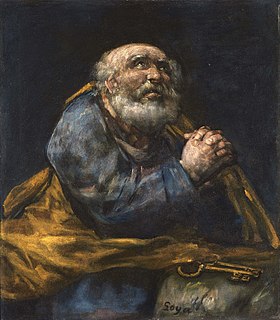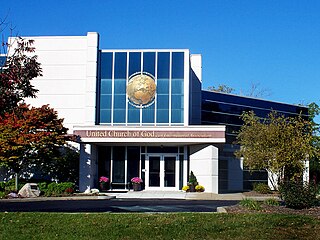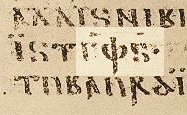
The Book of Amos is the third of the Twelve Minor Prophets in the Tanakh/Old Testament and the second in the Greek Septuagint tradition. Amos, an older contemporary of Hosea and Isaiah, was active c. 750 BC during the reign of Jeroboam II, making Amos the first prophetic book of the Bible to be written. Amos lived in the kingdom of Judah but preached in the northern kingdom of Israel. His major themes of social justice, God's omnipotence, and divine judgment became staples of prophecy.
Christianity is rooted in Second Temple Judaism, but the two religions diverged in the first centuries of the Christian Era. Christianity emphasizes correct belief, focusing on the New Covenant as mediated through Jesus Christ, as recorded in the New Testament. Judaism places emphasis on correct conduct, focusing on the Mosaic covenant, as recorded in the Torah and Talmud.

Predestination, in theology, is the doctrine that all events have been willed by God, usually with reference to the eventual fate of the individual soul. Explanations of predestination often seek to address the "paradox of free will", whereby God's omniscience seems incompatible with human free will. In this usage, predestination can be regarded as a form of religious determinism; and usually predeterminism, also known as theological determinism.

Nontrinitarianism is a form of Christianity that rejects the mainstream Christian doctrine of the Trinity—the teaching that God is three distinct hypostases or persons who are coeternal, coequal, and indivisibly united in one being, or essence. Certain religious groups that emerged during the Protestant Reformation have historically been known as antitrinitarian, but are not considered Protestant in popular discourse due to their nontrinitarian nature.

The Church of God of Prophecy is a Pentecostal Holiness Christian church. It is one of five Church of God bodies headquartered in Cleveland, Tennessee that arose from a small meeting of believers who gathered at the Holiness Church at Camp Creek near the Tennessee/North Carolina border on Saturday, June 13, 1903.

Unconditional election is a Reformed doctrine relating to predestination that describes the actions and motives of God in eternity past, before he created the world, where he predestined some people to receive salvation, the elect, and the rest he left to continue in their sins and receive the just punishment, eternal damnation, for their transgressions of God's law as outlined in the old and new Testaments of the Bible. God made these choices according to his own purposes apart from any conditions or qualities related to those persons.

In Christianity, contrition or contriteness is repentance for sins one has committed. The remorseful person is said to be contrite.

The United Church of God, an International Association is a Christian religious denomination based in the United States.

Arno Clemens Gaebelein was a Methodist minister in the United States. He was a prominent teacher and conference speaker. He was also the father of educator and philosopher of Christian education Frank E. Gaebelein.

"Servant of God" is a term used for individuals by various religions for people believed to be pious in the faith's tradition. In the Catholic Church, it designates an individual who is being investigated by the Church for possible canonization as a saint. In the Eastern Orthodox Church, this term is used to refer to any Eastern Orthodox Christian. The Arabic name Abdullah, the Hebrew name Obadiah (עובדיה), the German name Gottschalk, and the Sanskrit name Devadasa are all variations of "servant of God".
The Helvetic Consensus is a Swiss Reformed symbol drawn up in 1675 to guard against doctrines taught at the French Academy of Saumur, especially Amyraldism.
The idea of corporate election expresses a Christian soteriological view that understands Christian salvation as based on "God choosing in Christ a people whom he destines to be holy and blameless in his sight". Put another way, "Election is the corporate choice of the church 'in Christ.'" Paul Marston and Roger Forster state that the "central idea in the election of the church may be seen from Ephesians 1:4": "For he [God] chose us [the Church] in him [Christ], before the creation of the world to be holy and blameless in his sight." William Klein adds:
Here [in Ephesians 1:3-4] Paul states that God chose Christians in Christ before the creation of the world to be holy and blameless in his sight. The "chosen ones" designate the corporate group to whom Paul writes with himself included: God chose us. The focus is not on the selection of individuals, but the group of those chosen. As Westcott notes, "He chose us for Himself out of the world." Paul specifies the timing of this choice—it was pretemporal, before the world was created. God made the choice "in him". In other words, Christ is the principal elected one, and God has chosen a corporate body to be included in him."

The English word god continues the Old English god, which is derived from Proto-Germanic *ǥuđán.
God in Christianity is the eternal being who created and preserves all things. Christians believe God to be both transcendent and immanent. Christian teachings of the immanence and involvement of God and his love for humanity exclude the belief that God is of the same substance as the created universe but accept that God's divine nature was hypostatically united to human nature in the person of Jesus Christ, in an event known as the Incarnation.
This is a glossary of terms used in Christianity.
Catholic theology is the understanding of Catholic doctrine or teachings, and results from the studies of theologians. It is based on canonical scripture, and sacred tradition, as interpreted authoritatively by the magisterium of the Catholic Church. This article serves as an introduction to various topics in Catholic theology, with links to where fuller coverage is found.
The pre-existence of Christ asserts the existence of Christ before his incarnation as Jesus. One of the relevant Bible passages is John 1:1–18 where, in the Trinitarian interpretation, Christ is identified with a pre-existent divine hypostasis called the Logos or Word. There are nontrinitarian views that question the aspect of personal pre-existence or the aspect of divinity or both.
Christian theology is the theology of Christian belief and practice. Such study concentrates primarily upon the texts of the Old Testament and of the New Testament, as well as on Christian tradition. Christian theologians use biblical exegesis, rational analysis and argument. Theologians may undertake the study of Christian theology for a variety of reasons, such as in order to:

Eternal life traditionally refers to continued life after death, as outlined in Christian eschatology. The Apostles' Creed testifies: "I believe... the resurrection of the body, and life everlasting." In this view, eternal life commences after the second coming of Jesus and the resurrection of the dead, although in the New Testament's Johannine literature there are references to eternal life commencing in the earthly life of the believer, possibly indicating an inaugurated eschatology.
Patriology or Paterology, in Christian theology, refers to the study of God the Father. Both terms are derived from two Greek words: πατήρ and λογος. As a distinctive theological discipline, Patriology or Paterology is closely connected with Christology and Pneumatology.










